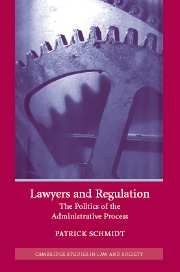Book contents
- Frontmatter
- Contents
- List of figures and tables
- Table of cases
- Acknowledgments
- List of abbreviations
- 1 Introduction
- 2 The contours of a regulatory bar
- 3 Administrative rulemaking
- 4 Rulemaking litigation
- 5 Enforcement
- 6 Regulatory counseling
- 7 Conclusion
- Appendix 1 Research methods
- Appendix 2 Survey instrument
- Notes
- Bibliography
- Index
6 - Regulatory counseling
Published online by Cambridge University Press: 11 July 2009
- Frontmatter
- Contents
- List of figures and tables
- Table of cases
- Acknowledgments
- List of abbreviations
- 1 Introduction
- 2 The contours of a regulatory bar
- 3 Administrative rulemaking
- 4 Rulemaking litigation
- 5 Enforcement
- 6 Regulatory counseling
- 7 Conclusion
- Appendix 1 Research methods
- Appendix 2 Survey instrument
- Notes
- Bibliography
- Index
Summary
For all the conflict, effort, and expense involved in disputes between the government and regulated companies, regulatory enforcement represents one path to the law's goal: compliance. In creating regulatory enforcement schemes, too much attention can be paid to methods of sanctioning law-breakers at the expense of encouraging compliance. Similarly, by focusing on lawyers' roles in fighting enforcement actions, one can overlook lawyers' roles in the nonadversarial process of compliance counseling. This chapter complements previous chapters by describing the roles of lawyers outside the scope of active rulemaking and enforcement matters. Like rulemaking and enforcement, counseling involves bargaining in the shadow of a legal process. Yet, removed from an active dispute or interaction with the regulator, lawyers are on very different turf.
Enforcement policies set the stage for the decisions companies make about how to comply with government regulations, a fact reflected in prior research. Building on decades of research exploring how businesses “capture,” transform, and use regulations for their own purposes, scholars have examined the ways in which agencies prevent and punish compliance. Much academic discussion revolves around the relative merits of economic and social sanctions (such as moral “shaming” and criminal penalties) for promoting compliance. Some advocates believe that cooperative regulatory programs generate better results than adversarial, punitive measures. An underlying question for these debates is to understand how companies decide how – even whether – to comply. Of course, rational economic analyses, focusing on the costs and benefits of compliance, offer elegant simplifying assumptions and one account.
- Type
- Chapter
- Information
- Lawyers and RegulationThe Politics of the Administrative Process, pp. 186 - 209Publisher: Cambridge University PressPrint publication year: 2005



